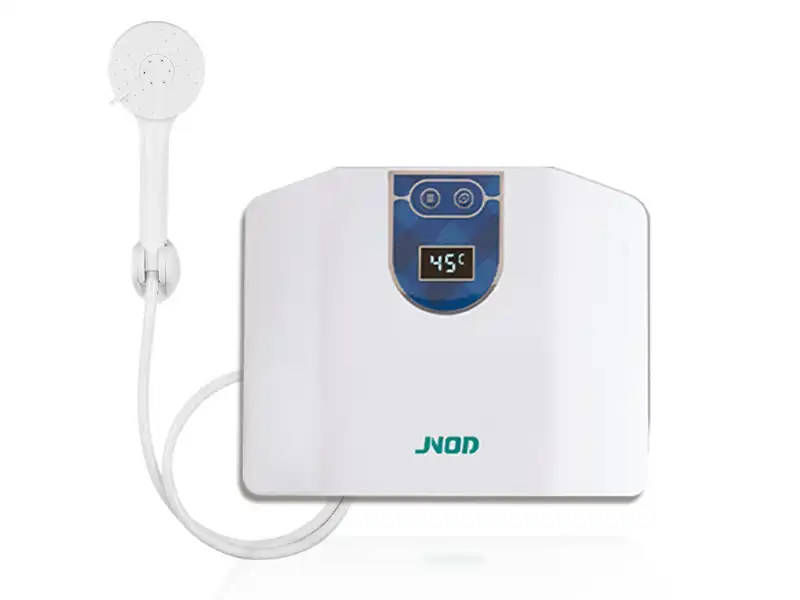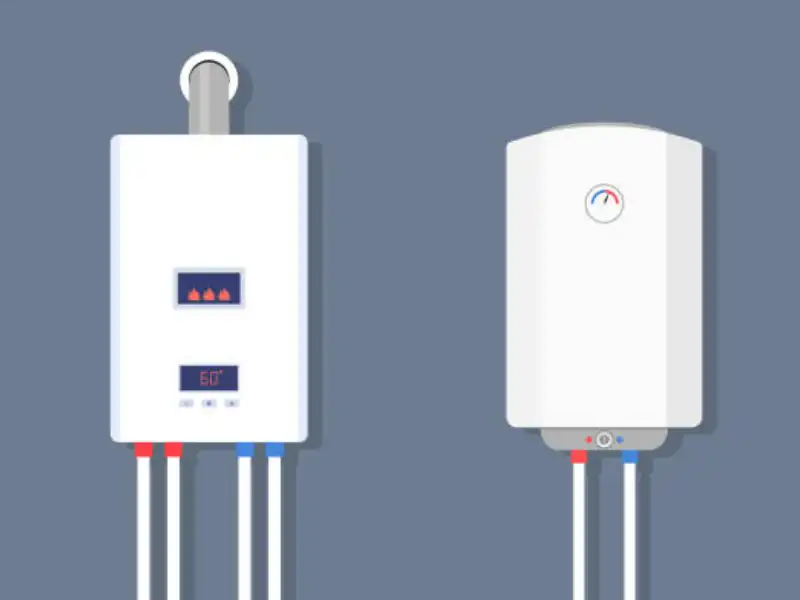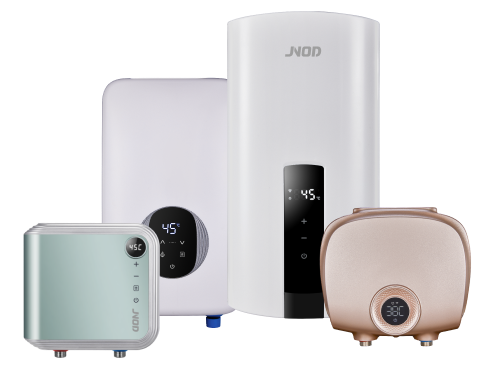With the surge in modern home upgrades, there’s been an undeniable shift towards more energy-efficient and compact appliances, and leading the pack are tankless water heaters. These appliances, especially when we’re comparing gas vs electric tankless water heater options, offer significant advantages over their traditional tank counterparts.
Why Go Tankless?

Tankless water heaters, at their essence, heat water directly without the need for storage. They spring into action only when the hot water tap is turned on, instantly heating cold water as it flows through. Unlike traditional water heaters that constantly store and heat water, tankless systems are on-the-go, eliminating standby energy losses.
Understanding how tankless water heaters work can help you appreciate their efficiency and benefits. There are lots of benefits of tankless units:
- High heat output: Ideal for larger homes and commercial spaces.
- Higher energy efficiency: The U.S. Department of Energy notes an 8%-34% increase in efficiency, based on usage.
- Geographical flexibility: Functions seamlessly in rural or remote areas.
- Long-term cost-efficiency: While influenced by propane prices, the overall energy savings balance out the costs.
- Safety considerations: Proper ventilation is crucial, and there’s an initial cost for vent lines. Regular maintenance minimizes risks associated with gas leaks.
Tankless water heaters represent a fusion of energy-saving and space efficiency. The upfront investment might be steeper, but the long-term savings make it an attractive option for professionals.
Key Factors to Consider When Choosing a Tankless Water Heater
When deciding between a gas vs electric tankless hot water heater, you should consider a few vital factors. These include your household’s water usage habits, the type of utilities available, and even personal preferences. Other aspects to think about are the installation costs, long-term running costs, and how groundwater temperature might affect the heater’s performance.
Household Water Flow Requirements
Determining whether to go with a gas vs electric tankless water heater also depends heavily on your household’s water flow needs. Generally, larger households or those with a high demand for hot water might find gas models more suitable due to their higher flow rate. Small households with lesser water usage might find electric units to be the best decision. It’s crucial to assess your family routine and water usage habits adequately, so you don’t find yourself in hot water, metaphorically speaking, of course.
Groundwater Temperature
Groundwater temperature is a crucial yet often overlooked factor in choosing between gas vs electric tankless water heater. It affects the unit’s ability to heat the incoming water to the desired temperature, impacting energy efficiency. In areas with colder groundwater, a gas unit might be a better choice, as they tend to have higher heating capacity. Consider your locale’s groundwater temperature and opt for a unit that aligns with your environmental conditions.
Installation Costs and Complexity
When comparing the installation complexities of tankless hot water heater gas vs electric, electric models usually come out on top due to their less complicated installation process. They don’t require venting or gas lines, reducing the initial cost of installation and hassle. However, gas models, although requiring more complex venting and potentially gas line upgrades, often prove to be more cost-effective in the long run, especially with rising electricity prices.
Long-Term Running Costs
Long-term running costs are pivotal when choosing between gas vs electric tankless hot water heaters. Electric models may have an efficiency rating upwards of 98%, meaning almost all the electricity consumed is converted into hot water. However, the average electricity cost in the U.S. hovers around 13 cents per kWh, as of 2022.
The efficiency of gas tankless heaters is typically 85-90%. Although slightly less efficient, natural gas prices are generally lower, averaging $9.20 per 1,000 cubic feet. It’s crucial to integrate these variables into your total cost model.
Maybe this is a bit abstract, a more concrete example: Assuming you need 180,000 BTUs/hour for heating, an electric model would consume around 52.7 kWh, costing approximately1.84 per hour.
Energy efficiency and fuel prices play a significant role in your choice, and assessing your area’s utility costs and availability will help make an informed, budget-friendly decision.
Maintenance Requirements
Diving deeper into the maintenance aspect of the tankless hot water heater electric vs gas debate, both types come with their own sets of requirements. Electric systems, being less intricate, generally demand minimal maintenance – perhaps an annual inspection and occasional cleaning of the inlet screen filter. Gas models, on the other hand, require regular checks of their ventilation and combustion systems. Consistent maintenance ensures a longer service life and peak performance, regardless of the type.
What is the Best: Tankless Water Heater Gas vs. Electric vs. Propane

For domestic utilization, after thorough analysis and consideration of various parameters, Electric tankless water heaters manifest as the supreme choice.
| Type of Water Heater | Pros | Cons |
| Propane Tankless Water Heater | High heat output suitable for larger homes Higher energy efficiency, fewer pollutants Available in rural or remote areas | Operating cost varies with fluctuating propane prices Needs proper ventilation, high cost for vent lines Flammable, explosion risks from leaks |
| Natural Gas Tankless Heater | Often more cost-effective in the long term Rapid and consistent hot water supply Good for larger households with multiple uses | Complex venting and potential gas line upgrades Adds to the initial cost |
| Electric Tankless Water Heater | Space-saving, suitable for tighter spaces Easier to install, no complex venting High level of energy efficiency Safer, no combustion involved Helps to reduce greenhouse gas emissions | Might struggle with a lot of hot water usage Energy cost varies with fluctuating electricity prices |
The electric tankless unit offers a harmonious blend of safety, environmental conservation, operational consistency, and economic efficiency. Its compactness, ease of installation, and high energy conversion efficiency make it a preferable option for professional users who prioritize reliable and eco-friendly solutions. Many top water heater manufacturers like JNOD offer a variety of electric tankless models, ensuring you have access to high-quality and efficient options.
Conclusion
When you are struggling between a gas and electric tankless water heater, it comes down to what works best for you. Think about the ongoing costs, how tricky it might be to set up, and how much work they need to keep running. You gotta balance all these things out to figure out what’s right for your place.
Get a Free Quote From JNOD
Specializing in electric tankless heaters, JNOD offers units that are energy-efficient, easy to install, and require little maintenance, providing a hassle-free solution to meet your hot water needs. Getting a free quote from JNOD is the first step in upgrading your business solutions. Don’t miss out on an opportunity to work with a team that’s committed to your success. Fill out our online form to get started.
